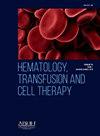Transmitted blood infections and emerging vector-borne diseases in blood donors in northern Portugal
IF 1.8
Q3 HEMATOLOGY
引用次数: 0
Abstract
Background
Screening of transfusion-transmissible infectious agents of blood components is carried out in order to guarantee the safety of the transfusion process. The objective of this investigation was to characterize cases positive for transfusion-transmissible infectious agents in blood donations in the North of Portugal.
Method
Data from 2010 to 2022 of the Local Health Unit-Santo Antonio were used for this study. In specific epidemiological situations, malaria, Chagas disease and West Nile virus were screened.
Main results
Over 12 years, the health unit, received 137,751 donations with 108 positive tests. The proportions of human immunodeficiency viruses, syphilis, human hepatitis viruses type B and C varied between 0 and 44/100,000 donations. In this period, two cases of malaria were detected in 2020–2021, and 21 were detected in 2022 corresponding to 52.1/1000 donations screened. In 2022, two cases of Chagas disease and no cases of West Nile virus were detected.
Conclusion
These results highlight the importance of a rigorous investigation at the time of donation in which the donor's history, including origin and movement in areas of greater geographic risk, are assessed. The recent and increasing detection of cases of malaria and Chagas disease confirms the presence of emerging infectious diseases transmitted by vectors, including mosquitoes, in blood donors. The increased risk of vector-borne diseases in Europe is a public health problem and represents a new challenge in screening donations.
在葡萄牙北部献血者中传播的血液感染和新出现的媒介传播疾病
背景:为了保证输血过程的安全,对血液成分的输血传播感染因子进行筛选。本调查的目的是确定葡萄牙北部献血中输血传播感染因子阳性病例的特征。方法采用圣安东尼奥地方卫生单位2010 - 2022年的数据进行研究。在特定的流行病学情况下,对疟疾、南美锥虫病和西尼罗河病毒进行了筛查。12年来,卫生部门共收到137,751笔捐赠,其中108笔检测呈阳性。人类免疫缺陷病毒、梅毒、乙型和丙型人类肝炎病毒的比例在0至44/100,000之间。在此期间,在2020-2021年期间发现了2例疟疾病例,在2022年发现了21例,相当于筛查的捐赠物中有52.1/1000例。2022年,发现了两例恰加斯病,没有发现西尼罗河病毒病例。结论:这些结果强调了在捐赠时进行严格调查的重要性,其中评估了捐赠者的历史,包括来源和在地理风险较大地区的运动。最近越来越多地发现疟疾和南美锥虫病病例,证实献血者中存在由包括蚊子在内的病媒传播的新发传染病。在欧洲,媒介传播疾病的风险增加是一个公共卫生问题,也是筛查捐赠方面的一个新挑战。
本文章由计算机程序翻译,如有差异,请以英文原文为准。
求助全文
约1分钟内获得全文
求助全文
来源期刊

Hematology, Transfusion and Cell Therapy
Multiple-
CiteScore
2.40
自引率
4.80%
发文量
1419
审稿时长
30 weeks
 求助内容:
求助内容: 应助结果提醒方式:
应助结果提醒方式:


